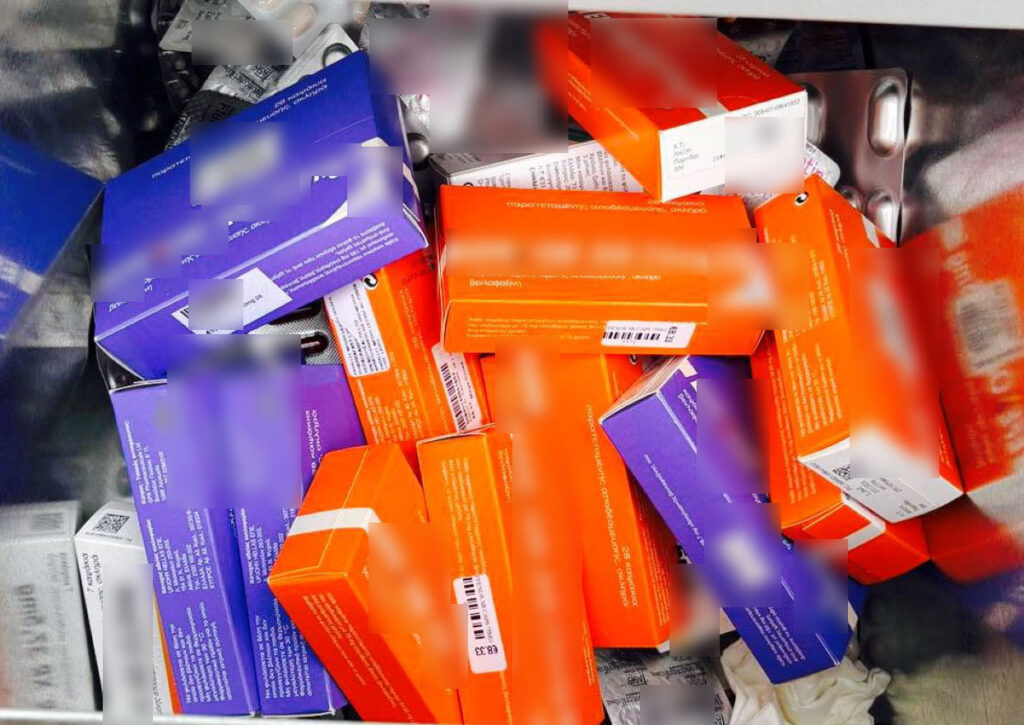Filenews 20 February 2025
Expensive medicines, cheap medicines, medicines of all kinds, three, four or more packages of the same formulation end up in garbage bags to be thrown away.
"My client, when his loved one died, threw away medicines worth several hundred euros. With anticoagulant injections, with expensive heart drugs. Lots of packaging. It is not possible to prescribe medicines in such large quantities and then simply destroy them, because a package that left the pharmacy and was kept at home for a few months is definitely not possible to use," a GHS pharmacist told F. "Even now, and after the restrictions that the HIO has applied to the GHS software for prescribing medicines, there are prescriptions that cause us particular concern and then we are returned many packages of the same preparation, either because the patient has passed away or because the patient no longer needs these medicines," he adds.
The position of this pharmacist is reinforced by the statement of the President of the Pancyprian Pharmaceutical Association, Plutarchos Georgiades, to "F", who stressed that "at the pace we are going, the beneficiaries of the GHS will put the System on the road to disaster".

The Health Insurance Organization, Georgiades said, "has implemented some restrictions on how medicines are prescribed, and it has done very well." However, "again pharmacists are observing some phenomena. For example, before the GHS, the prescription of a specific antibiotic concerned a package. Now, the prescription of the same medicine concerns two packages. The packages were not changed. They do not include fewer pills. The dosage for some reason has changed for almost all citizens and this phenomenon has probably become standard practice." Unfortunately, the president of pharmacists said, "citizens no longer appreciate the value of the medicines they take because they either get them for only €1 or the contributions they pay are small and we have certainly forgotten the amounts we paid for medicines in the pre-GHS era."
"Everyone should know that a medicine does not cost what we pay as a co-payment, i.e. €1 or as a contribution, but much more. Three or four packages of the same preparation cannot be returned to pharmacists. It means that something was not done right", said Mr. Georgiadis and continued: "wasting medicines is in no one's interest. Neither pharmacists, nor the HIO, nor the beneficiaries of the GHS. It is everyone's money that we are wasting. Pharmacists have long since put some of their comments before the HIO. The HIO was right to make specific restrictions and rules. In order for the GHS to function properly and for everyone to secure the medicines they need at the time they need them, everyone must cooperate. Both professionals and citizens. We must all feel responsible for protecting the GHS."
HIO: We probably need to revisit some issues
From time to time, "reports come to us from pharmacists to whom citizens return medicines because they do not need them," HIO Director Athos Tsinontidis told F. The Organization, he added, "has implemented specific restrictions on the GHS software as well. However, our pharmacists are constantly detecting some phenomena and certainly the effort to avoid waste must be constant on our part as well".
"But in order to succeed in curbing waste, there must be cooperation from everyone. Information also comes to us about citizens who require their doctors to prescribe certain quantities. I'm not going to say it's only doctors who are wrong, because it's not easy for them to be under constant pressure." Therefore, Mr. Tsinontidis concluded, "we probably need to re-study some issues and if some further actions are needed on the part of the Organization, we will take them."
«OSAC's firm position and requirement is that all patients have at their disposal the medicines they need, at the time they need them. The GHS is here to offer us and certainly waste is in no one's interest, first of all us patients", said the President of the Federation of Cyprus Patients' Associations, Charalambos Papadopoulos. "It would be irresponsible of us to say, 'It's okay to have stock that you don't need at home, but you don't have medicines.' We stress that GHS money is everyone's money. To ensure health services and medicines when we need them. That is why we call on everyone and the HIO to take its measures and on health professionals, doctors and pharmacists but also on patients themselves, to avoid actions that constitute waste. With the system applied to the GHS, we have different options for our medicines, something we did not have before the GHS. Even the contributions we pay, which in some cases seem high to us, are much lower than the actual price of a drug and we must always keep this in mind. Waste benefits no one. For each package we get from the pharmacy, we should also look at the actual price you indicate on it to understand that now in one way or another we are in a much better condition than before the GHS".
The process for the recycling of medicines is underway
The process of placing medicine recycling bins is in progress and already, as we are already informed, several pharmacies have been covered. In these bins, citizens can throw medicines that they do not need, whether they have expired or not. This practice is followed throughout Europe because when a medicine is stored under conditions that are not controlled, it cannot be given to patients, even if it has not reached its expiry date. Medicine recycling bins are placed, inside or outside the pharmacy and in those that are outside, citizens can drop the medicines they do not need 24 hours a day. It is estimated that by the beginning of 2026, a recycling bin will be installed in all pharmacies in Cyprus.
